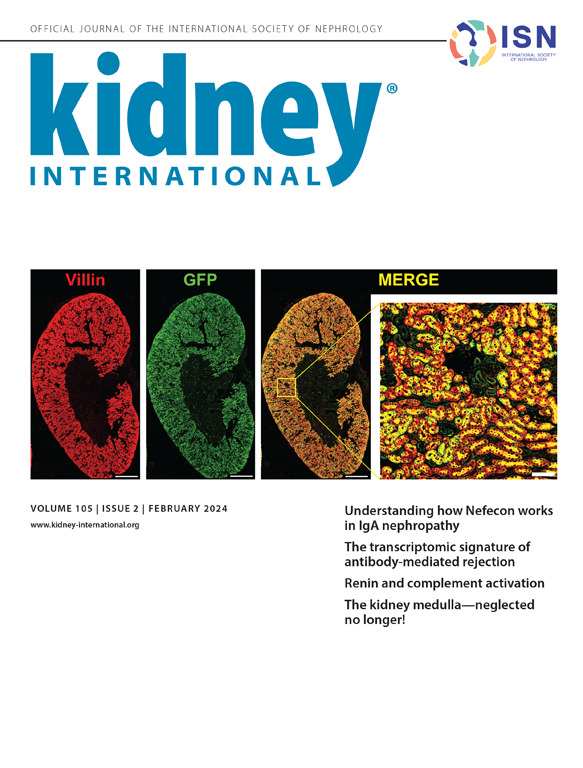抗肾素抗体指导小儿原发性局灶节段性肾小球硬化患者活体肾移植。
IF 14.8
1区 医学
Q1 UROLOGY & NEPHROLOGY
引用次数: 0
摘要
肾移植后疾病复发(KTx)仍然是原发性局灶节段性肾小球硬化(pFSGS)患者面临的主要挑战。在疾病早期复发的患者中发现了靶向狭缝隔膜蛋白nephrin的抗体。在这里,我们描述了监测和有效的移植前消除抗肾素抗体在青少年pFSGS活体供体KTx之前。方法采用ELISA、Western blot和免疫沉淀法检测移植前和移植后血清样本的抗肾素抗体。结果移植前治疗包括利妥昔单抗和重复血浆交换治疗可有效和持续降低抗肾素抗体。同种异体移植物功能保持良好,随访一年多无蛋白尿。进一步分析表明,抗体与另一种关键狭缝膜蛋白NEPH3(滤蛋白)有交叉反应。结论监测和移植前消除抗隔膜抗体可能成为pFSGS患者需要KTx的标准、个性化方法。本文章由计算机程序翻译,如有差异,请以英文原文为准。

Anti-nephrin antibodies guide living donor kidney transplantation in a pediatric patient with primary focal segmental glomerular sclerosis
Introduction
Disease recurrence after kidney transplantation (KTx) remains a major challenge in patients with primary focal segmental glomerulosclerosis (pFSGS). Antibodies targeting the slit diaphragm protein nephrin have been identified in patients with early disease recurrence. Here, we describe monitoring and effective pre-transplant elimination of anti-nephrin antibodies in an adolescent with pFSGS prior to living-donor KTx.
Methods
Anti-nephrin antibodies were assessed in pre- and post-transplant serum samples by ELISA, Western blot and immunoprecipitation using three different nephrin proteins.
Results
Pre-transplant treatment including rituximab and repetitive therapeutic plasma exchanges resulted in effective and sustainable reduction of anti-nephrin antibodies. Allograft function has remained excellent without albuminuria over a follow-up of more than one year. Further analysis showed that the antibodies were cross-reactive with NEPH3 (filtrin), another key slit diaphragm protein.
Conclusions
Monitoring and pre-transplant elimination of anti–slit diaphragm antibodies may become a standard, personalized approach in patients with pFSGS requiring KTx.
求助全文
通过发布文献求助,成功后即可免费获取论文全文。
去求助
来源期刊

Kidney international
医学-泌尿学与肾脏学
CiteScore
23.30
自引率
3.10%
发文量
490
审稿时长
3-6 weeks
期刊介绍:
Kidney International (KI), the official journal of the International Society of Nephrology, is led by Dr. Pierre Ronco (Paris, France) and stands as one of nephrology's most cited and esteemed publications worldwide.
KI provides exceptional benefits for both readers and authors, featuring highly cited original articles, focused reviews, cutting-edge imaging techniques, and lively discussions on controversial topics.
The journal is dedicated to kidney research, serving researchers, clinical investigators, and practicing nephrologists.
 求助内容:
求助内容: 应助结果提醒方式:
应助结果提醒方式:


